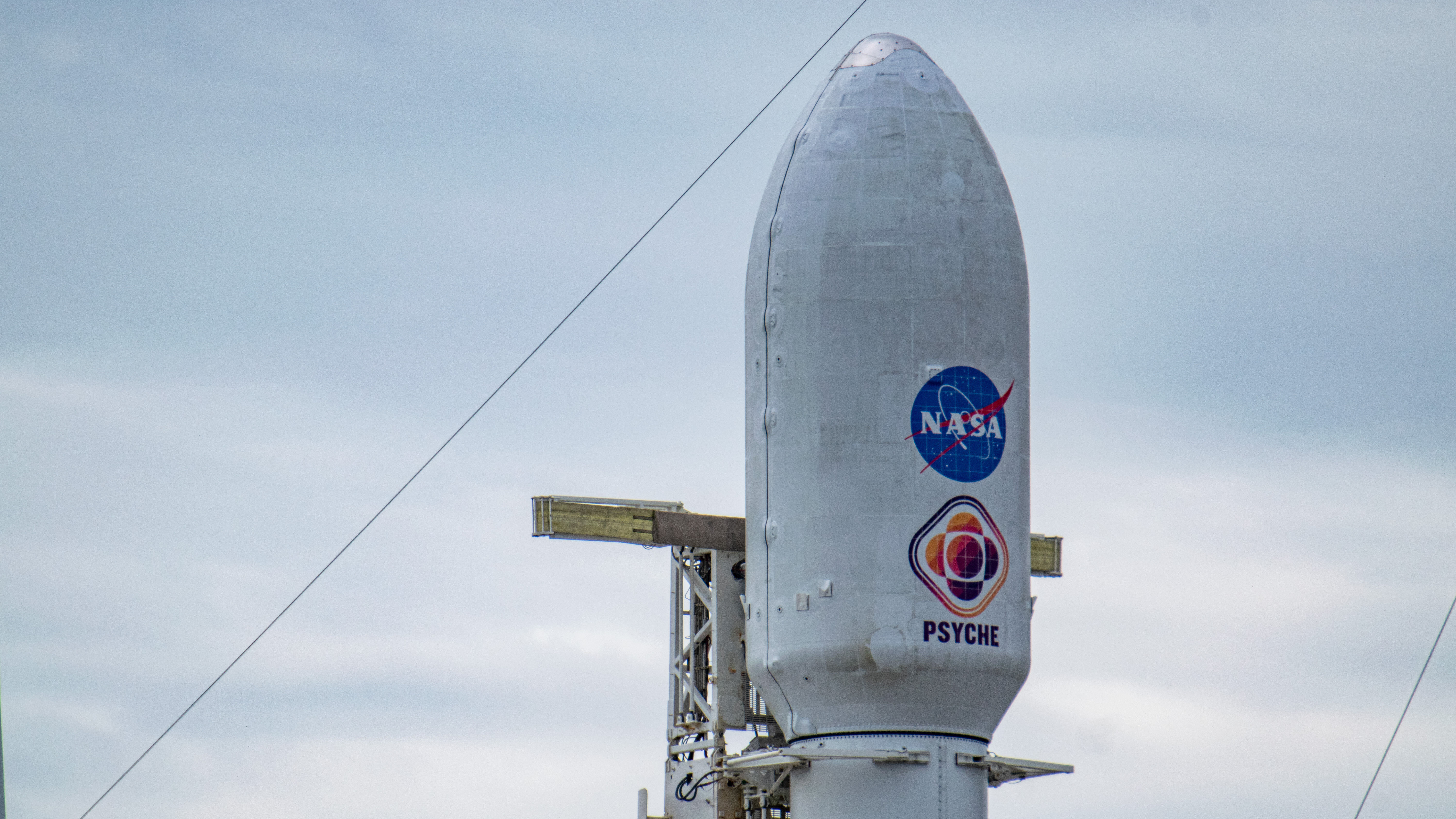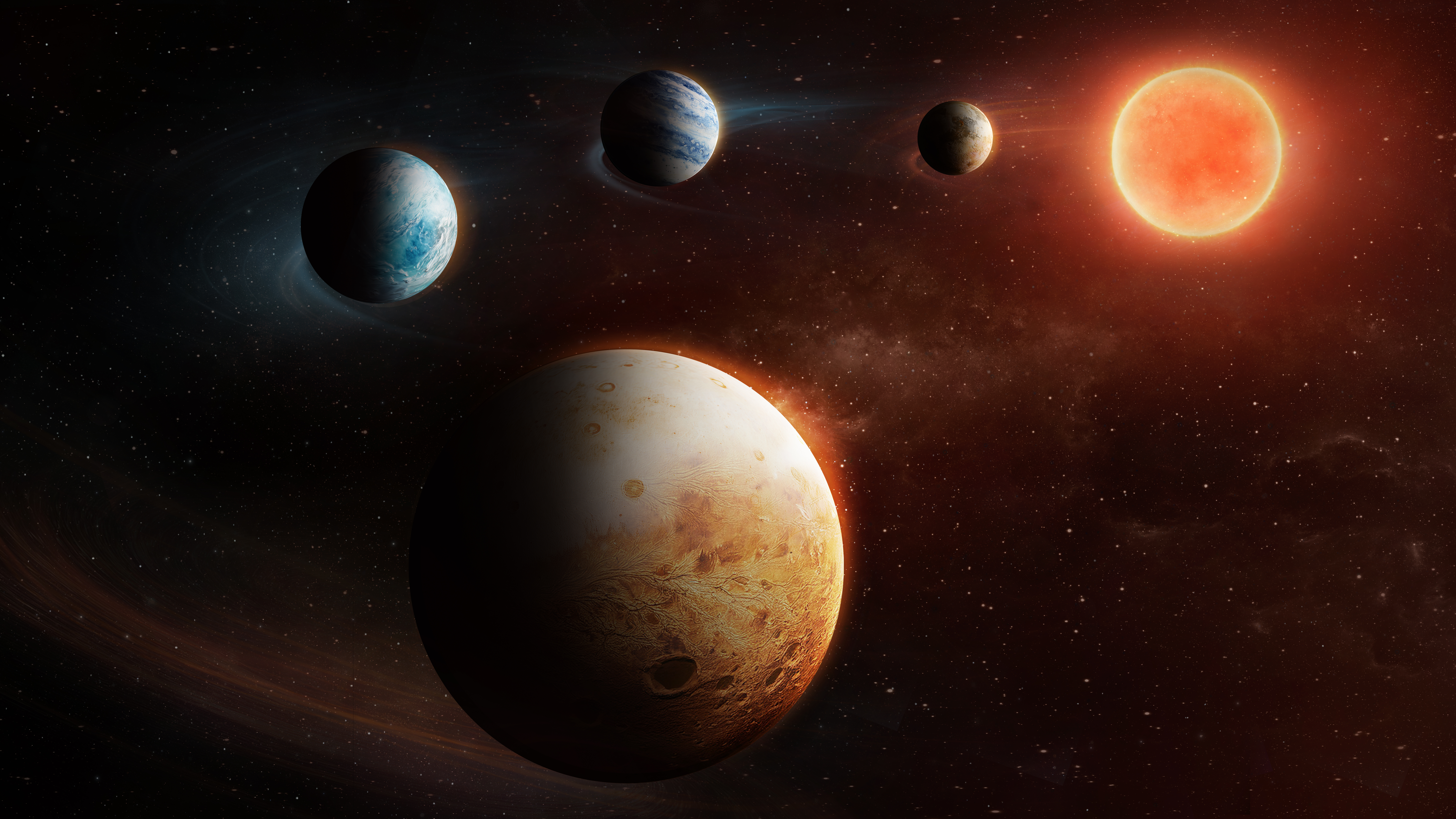Bad weather delays SpaceX Falcon Heavy launch of NASA's Psyche asteroid mission to Oct. 13
The big rocket is going to get pummeled by some storms overnight.

Breaking space news, the latest updates on rocket launches, skywatching events and more!
You are now subscribed
Your newsletter sign-up was successful
Want to add more newsletters?

Delivered daily
Daily Newsletter
Breaking space news, the latest updates on rocket launches, skywatching events and more!

Once a month
Watch This Space
Sign up to our monthly entertainment newsletter to keep up with all our coverage of the latest sci-fi and space movies, tv shows, games and books.

Once a week
Night Sky This Week
Discover this week's must-see night sky events, moon phases, and stunning astrophotos. Sign up for our skywatching newsletter and explore the universe with us!

Twice a month
Strange New Words
Space.com's Sci-Fi Reader's Club. Read a sci-fi short story every month and join a virtual community of fellow science fiction fans!
CAPE CANAVERAL, Florida — The launch of NASA's Psyche asteroid mission has been delayed until 10:19 a.m. EDT (1419 GMT) on Friday (Oct. 13), to account for inclement weather that's barreling in from the Gulf of Mexico.
Psyche, NASA's probe to explore a metal asteroid of the same name, was scheduled to launch on Thursday morning (Oct. 12) on a SpaceX Falcon Heavy rocket from Pad 39A here at NASA’s Kennedy Space Center. However, during a prelaunch press briefing on Wednesday (Oct. 11) , bleak predictions for the next morning’s forecast left only a 20% chance of favorable weather conditions.
As Wednesday night’s storms blew in, the decision was made to forgo Thursday’s launch attempt to capitalize on the better weather predicted for launch windows on Friday and Saturday (Oct. 14).
Related: NASA's Psyche metal asteroid mission will have a big impact on astronomy. Here's how
Arlena Moses, launch weather officer with the U.S. Space Force, was at Wednesday’s press briefing and explained the growing concerns.
"One of the main watch items now has kind of shifted from just the storms in the area to our liftoff winds," Moses said. "Behind this warm front and especially with that area of low pressure coming towards us, we expect winds to pick up very quickly out of the south and southwest. We could see 20 to 25 miles an hour [32 to 40 kph], likely some stronger gusts with that as well."
Those conditions were expected to persist through Thursday’s launch window, prompting mission teams Wednesday evening to make the decision to delay until Friday.
Breaking space news, the latest updates on rocket launches, skywatching events and more!
"For our first backup window, Friday morning, 50% chance for go conditions, with our concerns still being associated with storms in the area, where we have anvil clouds, some thick clouds, which are layered clouds, as well as cumulus clouds we get associated with storms," Moses explained during the briefing.
"Looking at Saturday morning, a third backup window, there is still about the same probability, about 50% chance of go, and fairly similar conditions here, where there may be some storms around, but we expect most of any storms to be after our morning launch window," she added.
The decision to forgo Thursday's window may also have to do with characteristics of Psyche's launch vehicle. SpaceX's Falcon Heavy has limited launch recycle attempts, meaning the rocket can be fully fueled for launch up to two times before needing maintenance enough to delay launch more than a couple days.
Tim Dunn, NASA's senior launch director for the Launch Services Program, touched on some of the resource constraints during Wednesday's briefing. "The limitations for recycled attempts is due to the vast quantity of densified LOX (liquid oxygen) that we use with the Falcon Heavy configuration," he explained. After a second fueling attempt, "we would be down about five days to replenish the LOX in the ground sphere and get it into a dissipated state," Dunn said.
So NASA is now aiming for Friday's 50% "go" window, with Saturday's similar coin toss chance of favorable launch conditions as a backup. The new plan allows a higher probability of success should the first launch attempt scrub closer to T-0 in the countdown.
Psyche's launch window runs through Oct. 25. After it gets off the ground, the probe will head toward the asteroid Psyche, which lies in the main asteroid belt between Mars and Jupiter. Astronomers think the bizarre metallic body may be the exposed core of a protoplanet; the Psyche mission will help them take its measure.

Josh Dinner is the Staff Writer for Spaceflight at Space.com. He is a writer and photographer with a passion for science and space exploration, and has been working the space beat since 2016. Josh has covered the evolution of NASA's commercial spaceflight partnerships and crewed missions from the Space Coast, as well as NASA science missions and more. He also enjoys building 1:144-scale model rockets and human-flown spacecraft. Find some of Josh's launch photography on Instagram and his website, and follow him on X, where he mostly posts in haiku.
